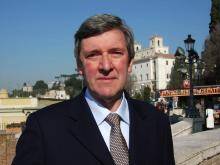Pope Francis visited a refugee camp on the Greek island of Lesbos with two Orthodox Church leaders on April 16, not only to express solidarity with the 2,500 refugees there and 60,000 others in 40 camps across Greece but also to encourage the governments, the churches and the peoples of the European Union’s 28 member states to respond with greater solidarity to the biggest humanitarian crisis on the continent since World War II.
The pope’s dramatic gesture came at a time when the influx of refugees from Syria and other countries was putting serious strains on the European Union’s fundamental principles, causing some states, under pressure from nationalist and xenophobic political forces, to block the free movement of people. These political tensions, and the fear of terrorism, had pushed the union on March 18 to negotiate an agreement with Turkey to end the irregular migration from that country, an accord criticized by human rights organizations and the office of the U.N. High Commissioner for Refugees.
Francis decided to visit Lesbos, through which 500,000 refugees transited to E.U. countries in the past year, as the union began deporting the first groups back to Turkey. Together with the Orthodox leaders, he met 300 refugees amid highly emotional scenes and cries for help and freedom from the terrified refugees in the camp, now a detention center, who fear deportation.
He told them he was aware of their suffering after being forced “to flee situations of conflict and persecution for the sake, above all, of your children” and “to leave behind everything that is dear to you and—what is perhaps most difficult—not knowing what the future will bring.”
Then, before having lunch in a shipping container with eight refugees, the Christian leaders signed a joint statement appealing to “world opinion” not to ignore this “colossal humanitarian crisis,” which, they declared, is “fundamentally a crisis of humanity” that calls “for a response of solidarity, compassion, generosity and an immediate practical commitment of resources.”
They appealed to the international community “to respond with courage” to the crisis “and its underlying causes” by working to end the wars and violence in the Middle East. They called for “a broader international consensus and an assistance program” to “defend fundamental human rights, protect minorities, combat human trafficking and smuggling, and eliminate unsafe routes.” They asked all countries to give asylum to the refugees and expand their relief efforts. They praised the Greek people for their generosity to the refugees, despite their own economic difficulties.
The pope, patriarch and archbishop are aware of the problems E.U. governments face from political and xenophobic forces that stir anti-immigrant backlash. They know that many Christians too, even some bishops, view this influx of refugees as a Muslim invasion of Europe that poses a serious threat to the continent’s Christian values.
Francis sought to allay such fears during a memorial service at the port of Mytilene for the refugees who drowned at sea. “The worries expressed by institutions and people, both in Greece and in other European countries, are understandable and legitimate,” he said. But, he added, “we must never forget that migrants, rather than simply being a statistic, are first of all persons who have faces, names and individual stories.”
Significantly, he reminded everyone that “Europe is the homeland of human rights, and whoever sets foot on European soil ought to sense this, and thus become more aware of the duty to respect and defend those rights.”
He and the Orthodox leaders asked religious communities “to increase their efforts to receive, assist and protect refugees of all faiths” and promised their churches would defend the fundamental human rights of refugees, asylum-seekers and migrants.
On Sept. 6, 2015, Francis asked every Catholic parish and religious community in Europe to give shelter to a refugee family and instructed the Vatican’s two parishes to accept two such families.
He concluded his visit to Lesbos with a prophetic gesture: He brought three Syrian Muslim families back to the Vatican with him on the plane. By this act, Francis is calling on European states, peoples and churches alike to respond in a truly human way, with solidarity, to this grave crisis.








